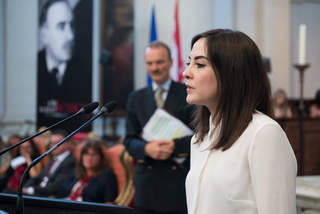
Dilek Aydin, TÜSIAD/ TISK © Dilek Aydin
EU-Turkey relations: “Values-based cooperation requires a forward-looking process“.
Turkey borders numerous countries where military conflicts have occurred in recent years. What does the difficult political situation in the region mean for Turkey and Turkish businesses?
Global and regional power shifts create a fertile ground for instability and conflict in the European neighborhood. Geo-political and geo-economic dynamics reveal us that the ideals and assumptions of the late last century can no longer be taken for granted. We have been witnessing contestation of liberal and rules-based order even in the least expected geographies.
Exclusionist and misguided policies can be devastating for our societies. The main message is clear: strong democracy, rule of law, independent and robust institutions are central to the political, economic and social stability. As a matter of fact, this goes beyond stability; it is about sustainable peace, quality of life, social cohesion, innovation, productivity and competitiveness. It is about achieving a sustainable development model with all its dimensions.
For the Turkish business community, therefore, the fundamental question is to elaborate a strong roadmap for the 21st century to progress on all fronts of the UN Sustainable Development Goals. Hence, Turkish business community’s proposal for a roadmap covering various policy areas in this direction is recently published focusing on three fundamentals: people, science and institutions.
How does TÜSIAD assess the political and economic development in Turkey?
The consequences of the COVID-19 pandemic and the necessary green and digital transformation require a comprehensive reform agenda. Thanks to the measures taken since the beginning of the crisis, the Turkish economy has recovered quickly.
However, structural problems remain. For sustainable growth out of the crisis, short-term measures such as tight monetary and fiscal policy or credible disinflation need to be complemented by an ambitious structural reform agenda in the medium term. It should focus on the labour market, taxation, capital markets, green and digital transformation, energy, agriculture and education.
Strengthening the rule of law and the independence and impartiality of the judiciary are also crucial for a competitive economy. Turkey's experience over the past decades clearly shows that democratic and economic reforms cannot be decoupled.
What are your expectations of the next federal German government regarding Turkish-German relations?
German elections have been followed closely by the Turkish public. This attentiveness highlights the deeply rooted relationship between two countries based on various factors; comprehensive economic partnership, number of German citizens with Turkish background, political ties with deep historical roots. German companies in Turkey are mostly members of TUSIAD. They have been main trade, investment, tourism and technology partners of Turkey, with profitable business operations notwithstanding the ups and downs in the global economy and the political context. These fundamentals are independent from the changes in the government.
We need to set a concrete agenda to expand our relations and adapt it to the current trends. Stronger engagement and cooperation in green and digital transformation, research and innovation, enhancing the economic ties on bilateral and European Union-Turkey level would be key priorities for the Turkish business community.
What are TÜSIAD’s priorities in the EU-Turkey relations?
Turkey's EU accession perspective was a wise framework for EU-Turkey relations in the 1990s and 2000s. Today, too, value-based cooperation requires a forward-looking process with strong commitment, concrete goals and in the spirit of European integration.
We have four proposals for the further development of EU-Turkey relations:
- Reactivate a constructive integration partnership, including in the areas of migration and trade. In doing so, we should refrain from transactional models of cooperation.
- Maintaining the legal basis of our relations, i.e. an EU accession perspective for Turkey.
- Start negotiations on the modernisation of the EU-Turkey Customs Union as a matter of priority, in line with the sustainable development agenda.
- Inclusion of the European Green Deal in the negotiations on the modernisation of the Customs Union.
On a totally different matter: lobbying in Brussels. As BDI representatives in Brussels we know about lobbying for the interests of an industry inside the EU. What are the challenges and, perhaps, opportunities to represent the interests of an economy outside the EU towards the EU institutions?
Today, there is no way around a strong representation of the interests of the Turkish economy vis-à-vis the EU institutions. The rules set in Brussels are very important for Turkey. This is related to the so-called "Brussels effect": The influence of European regulations and standards reaches far beyond EU borders. Moreover, Turkey's integration into the European single market is well advanced.
It is a great challenge to represent interests in Brussels without coming from an EU member state. This is because we do not directly represent the interests of EU voters and taxpayers. Therefore, we work particularly hard to be a reliable source of information and analysis for the EU institutions. And we cooperate very closely with the European business federation BusinessEurope, and its members, the national industry and employers' organisations. We are united by common interests and visions for a globally competitive Europe.



